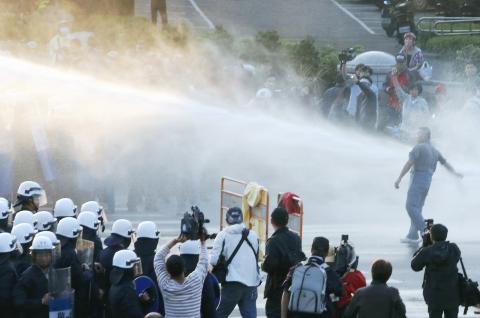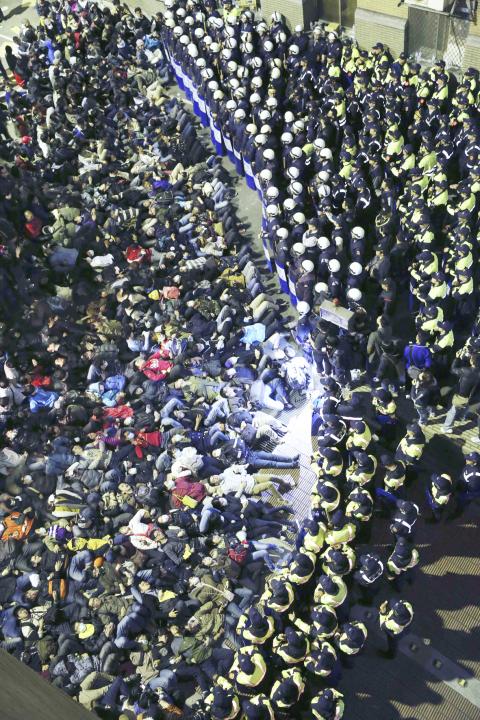At 5:45am yesterday, thousands of students protesting the cross-strait service trade agreement sat near the Executive Yuan complex on Zhongxiao E Road in Taipei “paying silent tribute to [the demise of our] democracy” and praying for the approximately 60 protesters injured when police forcibly ended their occupation of the Executive Yuan’s main building hours earlier.
The students said they “have no fear” of the possible repercussions their actions may have as they left the area to rejoin the protesters occupying the Legislative Yuan on the seventh day of the protest against the trade pact.
At 11pm on Sunday night, Premier Jiang Yi-huah (江宜樺) ordered the National Police Agency to evict the activists occupying the Executive Yuan before dawn. Jiang gave the order after speaking to President Ma Ying-jeou (馬英九) by telephone.

Photo: Reuters
After trying to pull, lift or drag protesters from the site, police employed two water cannon trucks, shields, batons and sticks to eventually remove all protesters from the Executive Yuan complex at 5:10am.
About 1,000 protesters remained outside on Zhongxiao E Road, while others gathered at the main entrance of the complex at the intersection of Zhongxiao E Road and Zhongshan S Road after 6am, prompting officers to turn the water cannons on them again. Not until after 7:15am were police able to reopen the roads to traffic.
The Executive Yuan said that at least 110 people were injured in the melee, including 52 police officers, while 61 people were arrested.

Photo: Reuters
At about 5:15am, several SWAT team officers approached Dennis Wei (魏揚) — a National Tsing Hua University graduate student and convener of the Black Island National Youth Front that masterminded the legislative siege — and handcuffed him because police believe he had instigated the storming of the Executive Yuan compound.
Wei had earlier said that confrontations with police at the Executive Yuan were to be expected, but “we [the protesters] are not deterred by that.”
“If we fear being forced out, we won’t be able to defend our democracy. We want to show the Ma administration the people’s determination,” he said.
The movement was sparked by the Ma administration’s perceived attempt to ram the pact through the legislature and follows months of calls by several sectors of society and public officials to renegotiate the deal or scrap it altogether.
Critics say the trade deal was negotiated illicitly without consulting the public, is skewed in China’s favor and puts Taiwan’s national security at risk, reasons cited by the protesters in their demands that the government suspend the pact and implement legislation to monitor future cross-strait dealmaking.
Less than an hour after hundreds of students forced their way into the Executive Yuan complex by throwing quilts over the razor wire around it, more than 2,000 activists gathered at the site, outnumbering the approximately 200-strong police force.
While more police were called in, the students set up audio equipment, moved in supplies from the legislature, hung up a giant banner, burst into some offices on the second floor of the main building and gathered at three main entrances and two other areas in the complex.
An hours-long standoff with police in all five places ensued, during which the students sat down arm-in-arm and shouted slogans as officers cleared people from Beiping E Road and assembled more riot police and SWAT officers there with two water-cannon trucks. The police force eventually numbered more than 3,000.
The protesters shouted at police to protect the people as the police drove a water cannon truck into the back door of the complex on Beiping E Road and forced some reporters from the scene.
At about 1:30am, the protesters lay down arm-in-arm to make their removal more difficult. Some with bleeding faces appeared to have been beaten up by police.
“I am really sad. My father is a police officer. Why are people in this country forced to attack each other? The police will kick you and beat you with batons,” said one man in tears who declined to be named.
A professor surnamed Fang (方) said police had kicked him in the chin, but that he “will go back, because my students are still there.”
Democratic Progressive Party (DPP) officials led by DPP Chairman Su Tseng-chang (蘇貞昌) urged police not to use force.
More people forced out of the complex were injured, including Taiwan Solidarity Union Legislator Chou Ni-an (周倪安) and a man suspected of suffering from epileptic seizures. They both lay on Beiping E Road for more than 10 minutes before being helped by medical personnel.
At about 4:20am, the police began to spray water at protesters gathering in the front square of the complex and at the entrance of the main building, and dragged some of them away. Scores of protesters lay down in front of the water cannon truck, and they were sprayed several times.
A man surnamed Chu (朱) said the police slapped him in the face when they pulled him out of the building.
“I didn’t resist the eviction. You wanted to lift me up from the ground, that’s fine, but why did you slap me?” Chu asked.
That night, ambulance sirens were heard often around the complex while medical volunteers rushed about to take care of emergencies.
“President Ma should take the biggest responsibility for the situation today, because he never listens to what people have to say. I didn’t think the Ma government should resolve any issue with the public by resorting to the use of police force. It will only create more resentment,” a man surnamed Kao said.
Meanwhile, saying that no violence should be used against students expressing their views on key national issues, the heads of the Greater Kaohsiung and Greater Tainan special municipalities — both governed by the DPP — yesterday said they are unwilling to offer further police backup to Taipei.
One-hundred-and-twenty officers who were sent from the two special municipalities to Taipei were recalled the previous week.
Additional reporting by CNA

INVESTIGATION: The case is the latest instance of a DPP figure being implicated in an espionage network accused of allegedly leaking information to Chinese intelligence Democratic Progressive Party (DPP) member Ho Jen-chieh (何仁傑) was detained and held incommunicado yesterday on suspicion of spying for China during his tenure as assistant to then-minister of foreign affairs Joseph Wu (吳釗燮). The Taipei District Prosecutors’ Office said Ho was implicated during its investigation into alleged spying activities by former Presidential Office consultant Wu Shang-yu (吳尚雨). Prosecutors said there is reason to believe Ho breached the National Security Act (國家安全法) by leaking classified Ministry of Foreign Affairs information to Chinese intelligence. Following interrogation, prosecutors petitioned the Taipei District Court to detain Ho, citing concerns over potential collusion or tampering of evidence. The

TRADE: The premier pledged safeguards on ‘Made in Taiwan’ labeling, anti-dumping measures and stricter export controls to strengthen its position in trade talks Products labeled “made in Taiwan” must be genuinely made in Taiwan, Premier Cho Jung-tai (卓榮泰) said yesterday, vowing to enforce strict safeguards against “origin laundering” and initiate anti-dumping investigations to prevent China dumping its products in Taiwan. Cho made the remarks in a discussion session with representatives from industries in Kaohsiung. In response to the US government’s recent announcement of “reciprocal” tariffs on its trading partners, President William Lai (賴清德) and Cho last week began a series of consultations with industry leaders nationwide to gather feedback and address concerns. Taiwanese and US officials held a videoconference on Friday evening to discuss the

NEGOTIATIONS: The US response to the countermeasures and plans Taiwan presented has been positive, including boosting procurement and investment, the president said Taiwan is included in the first group for trade negotiations with the US, President William Lai (賴清德) said yesterday, as he seeks to shield Taiwanese exporters from a 32 percent tariff. In Washington, US Trade Representative Jamieson Greer said in an interview on Fox News on Thursday that he would speak to his Taiwanese and Israeli counterparts yesterday about tariffs after holding a long discussion with the Vietnamese earlier. US President Donald Trump on Wednesday postponed punishing levies on multiple trade partners, including Taiwan, for three months after trillions of US dollars were wiped off global markets. He has maintained a 10 percent

PERSONAL DATA: The implicated KMT members allegedly compiled their petitions by copying names from party lists without the consent of the people concerned Judicial authorities searched six locations yesterday and questioned six people, including one elderly Chinese Nationalist Party (KMT) member and five KMT Youth League associates, about alleged signature forgery and fraud relating to their recall efforts against two Democratic Progressive Party (DPP) legislators. After launching a probe into alleged signature forgery and related fraud in the KMT’s recall effort, prosecutors received a number of complaints, including about one petition that had 1,748 signatures of voters whose family members said they had already passed away, and also voters who said they did not approve the use of their name, Taipei Deputy Chief Prosecutor